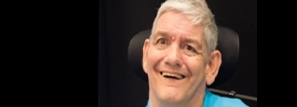I first started visiting Capability Scotland’s care facility for disabled people at Upper Springland as part of my remit when I was part funded by Kinnoull Church. For years I had kept my ends meeting purely on gospel concerts and CD sales, but 12 years ago when things started slowing down, the church very generously took me on as a kind of part time musical team member with a remit to offer my skills to schools etc in Perth. It built up to take in things going on in Grammar, Academy, High, Kinnoull Primary, Kincarrathie House and Upper Springland. A busy time! I developed quite a sizable work among learning support children in Perth High and looking back it was part of the journey to what is going on now.
Of all the different places, working with the disabled people just became special. The big realisation was that staffing levels just did not allow for detailed individual attention for things like music. Music was really just a group in a circle hitting things etc. I started seeing one or two people individually and found myself more and more thinking through the whole ‘parallel’ thing. For years I had thought that ‘para’ in Paralympics was to do with people being paralized … till I heard it was fundamentally about parallel thinking.
So, in my musical field … parallel thinking goes like this. Get any group of 20 or so able bodied people together and most will really just want to listen to music and enjoy it that way. Half a dozen will want to learn an instrument or sing, and out of those, most will love the thought of performing in public once confidence is up. Now, it is just taken as read that learning an instrument needs weekly individual tuition, and regular practicing, because it involves muscle memory as well as cerebral learning. No-one would dream of their kid getting into the school orchestra without tuition and practice, and over a long period of time. Three or four years is about average. Any child getting straight into school orchestra in first year at school has probably started back in Primary school. Once skill is achieved, the rewards to the child are huge..sense of belonging, camaraderie in the music team, giving pleasure to others, trips, and the joy of the medium itself … . Whether it’ s football, painting, music, or anything, there is a purity in the actual subject … real beauty. The good teacher I think fundamentally is trying to open the pupil up to that.
So, transfer all of that to the disabled community. I just started trying to offer the opportunity for anyone who wanted to learn to play something within their own limitations to receive individual lessons. Very quickly I realised that time restraints meant that within the studio hours, I had very little chance of getting much individual time with those who didn’t live at Upper Springland. So I began offering to parents a free service of me travelling to their homes for weekly individual lessons, while, for those who wanted it within Upper Springland. individual time in their flats. Some, were quite happy just to come to practices with four or five people, and their own personal achievement, although not stretching to learning sequences of notes, was still significant in terms of muscle memory and familiarity with playing.
The individual home lessons were hugely well received by parents. I had parents say things like … no one has taken time with her before like this..she looks forward to every lesson … In terms of materials, I just set about accumulating lots of portable keyboards and guitars … I would buy things I saw in charity shops, and David Benson’ s mum Margaret was incredibly generous and did the same. I set about designing stands set to exact heights to hold keyboards and guitars in best positions for disabled players. I also made individual lesson videos on DVD and Youtube, and this worked very well.
The next significant stage on the ‘parallel’ journey was to suggest to the players that we go outside Upper Springland and entertain the public. I started small … I suggested taking 5 people to Kincarrathie House Care Home. The response from the players was so moving for me. I remember Lewis straightaway saying ‘ what songs do you think the old people would like? ’ a lovely thought about the audience, not about himself … They all then went through another parallel process.. being highly nervous before the event. Lewis almost pulled out several times. The day came, and a couple of them were physically shaking … a moment when you doubt and think..is it fair to put disabled people through this??? Even after the very first song and the audience’s applause though, the look of triumph, relief and joy among the players will stay with me .. Straight after the performance, I knew it had been worth it, and started a pattern of trying to get something monthly.
In a discussion about what we should call the orchestra, it was Sarah Chapman who came up with the name The Inspiration Orchestra, and it has stuck!
A big blow came when the church, with the retiral of David Souter the minister, decided not to continue with my funding. I remember being out on a 10k running event [ on Arthur’s seat in Edinburgh!] and just going over and over in my mind that this work was something I just really believed in … all the other school stuff was good too, but other people were covering what I had been doing. The disabled stuff was special. I decided I would approach one of the parents, Margaret Benson, and put it to her that we gather together a few like minded people and brave it and go through the long process of registering as a Scottish Charity.
We went through the process, and were registered on March 9th 2016. The Trust has no religious affiliation, or religious purpose outlined in its constitution. We are here for disabled people, pure and simple.
Additional info here


